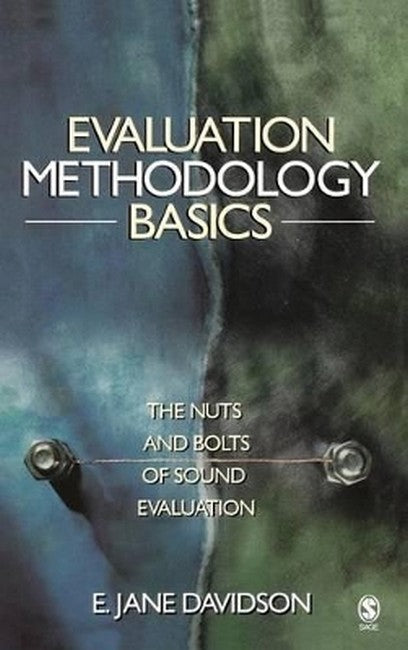E. Jane Davidson is an internationally recognized evaluation specialist, best known for developing evaluation rubrics as a methodology for drawing conclusions about quality and value. She has also made significant contributions in the areas of causal inference for qualitative and mixed methods, and in synthesis methodologies for evaluation.Dr. Davidson is sought after internationally as a speaker and workshop presenter for her signature approach of methodologically robust but refreshingly practical evaluation with breathtaking clarity. She has presented keynotes and invited workshops in the US, Canada, the UK, Sweden, Denmark, Singapore, Brazil, South Africa, Australia, and New Zealand. She is former Associate Director of the internationally recognized Evaluation Center at Western Michigan University, where she launched and directed the world's first fully Interdisciplinary Ph.D. in Evaluation. She was the 2019 recipient of the American Evaluation Association's prestigious Paul F. Lazarsfeld Evaluation Theory Award.
Request Academic Copy
Please copy the ISBN for submitting review copy form
Description
What is Evaluation? Basic Definitions A Note About Fitting Evaluation Approach to Purpose The Steps Involved The Ingredients of a Good Evaluation Identifying the Evaluand Additional Readings Exercises Defining the Purpose of the Evaluation Evaluations for Determining Overall Quality or Value Evaluations for Finding Areas for Improvement Questions About Absolute vs. Relative Quality/Value Summary and Final Comments Additional Readings Exercises Identifying Evaluative Criteria Why Not Just Use Goals? Identifying Criteria: Basic Concepts and Tools Conducting a Needs Assessment Identifying Other Relevant Criteria Additional Readings Exercises Organizing the Criteria & Identifying Potential Sources of Evidence The Importance of Choosing Multiple Sources of Quality Evidence The Process Evaluation Checkpoint The Outcome Evaluation Checkpoint The Comparative Cost-Effectiveness Checkpoint The Exportability Checkpoint Additional Readings Exercises Dealing With the Causation Issue Certainty about causation Inferring causation: Basic principles Inferring causation: Seven strategies Choosing a blend of methods to address the causation issue Additional Readings Exercises "Values" in Evaluation The Controversy The Three Types of Subjectivity The Tensions Between Subjectivism and Common Sense Where do the "Values" in an Evaluation Come From? Additional Readings Exercises Determining Importance Determining Importance: What and Why Determining Importance: Six Strategies Additional Readings Exercises The Merit Determination Step Determining Merit: What and Why Using Rubrics for Determining "Absolute" Merit Using Rubrics for Determining "Relative" Merit Making practical use of merit determination rubrics Additional Readings Exercises Synthesis Methodology Synthesis: What and Why The Role of Costs and Comparisons in Synthesis Synthesizing for "Grading" Synthesizing for "Ranking" Additional Readings Exercises Putting it All Together The KEC Preliminary Checkpoints The KEC Foundations Checkpoints The KEC Subevaluations Checkpoints The KEC Conclusions Checkpoints Additional Readings Meta-Evaluation The five criteria for evaluating evaluations Key points to remember in meta-evaluation Other options for conducting a meta-evaluation Formative meta-evaluation Should I use meta-evaluation myself? Additional Readings Exercises Answers to Selected Exercises Sample Exam Questions Tips for students answering these exam questions The questions A rubric for grading assignment and exam answers Suggested answers to practice exam questions Glossary References
"Amidst the wash of methods books available to evaluators, Davidson's book provides powerful techniques for asking and answering the important foundational questions in any program evaluation." -- Doug Leigh "This is a very well written book that offers a unique perspective on long-practiced evaluation techniques and presents several new, potentially very useful, techniques that return "valuation" to the evaluation process." -- Greg Roberts "What is evaluation-specific logic and methodology? This book answers that question in a way that is persuasive, accessible, and understandable. It presents a set of principles and procedures to guide the task of blending descriptive data with relevant values to draw explicitly evaluative conclusions. The book makes a significant contribution to positioning evaluation as a unique and special field of inquiry and judgment." -- Michael Quinn Patton "Evaluation Methodology Basics is yet another excellent book from Sage. This would be a good book to use for a graduate-level course in evaluation techniques or as a template for anyone who is new to the techniques of program evaluation." -- Annette M. Matthews "The text is not only a great introduction for novices, but a toolbox with new perspectives for conducting sound evaluation that integrates values with facts into evaluative conclusions. As such Evaluation Methodology Basics should be on every evaluator's shelf." -- Daniela Schroeter "I welcome this student-friendly text to complement my favorite checklists. This text develops the core checklist framework to provide evaluation methodology basics for, presumably mainly, introductory courses on program evaluation." -- Colin Sharp

